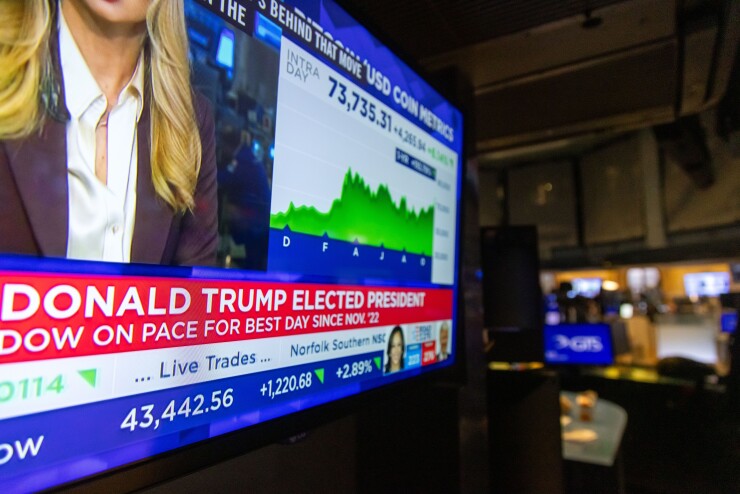
There's an aphorism in Washington known as a "mandate," whereby a candidate's electoral victory confers legitimacy on their preferred policies. That expression hasn't been widely used for a long time, if for no other reason than because most of the last half-dozen presidential elections have been nail-bitingly close.
That wasn't the case in
So if Trump has a mandate, what is it? That is somewhat difficult to say. Part of the reason the mandate concept is flawed is because different voters can vote for the same candidate for very different — indeed, even contradictory — reasons, and that is especially true in the case of a candidate whose policies are as heterodox as Trump's. Some voters may have voted for him because of his promise to deport millions of immigrants, while just as many may have voted for him despite that promise.
But if his mandate can be distilled to its essence, it is to bring back the economy he oversaw between 2017 and early 2020 — record markets and low inflation, less meddlesome regulation and more money in people's pockets.
Most of these ideas fit together: lowering banks' compliance costs leaves more profits to be shared with investors, boosting share value and juicing the market, which makes people's investments more valuable and creates at least the appearance of more money in their pockets. So long as inflation remains in check, banks and everyone else should be looking forward to a far more favorable business environment for the next four years.
While a return to a bygone economy may be Trump's mandate, it is not the entirety of his agenda. Perhaps even more than his economic message, his central campaign promise was to expeditiously deport millions of people who live in the country without legal permission. Leaving aside the valid questions of humanity and due process that such a move raises, the sudden and permanent disappearance of millions of people who lived, ate and spent money here would further reduce an
Fewer workers also implies higher wages for the ones who are left and higher prices for the smaller number of things that they produce — that's inflationary pressure. If comparable goods can be imported at a lower price, that pressure could be reduced, but another pillar of Trump's economic vision is to impose tariffs on almost all imports, but especially on those from China and Mexico — the country's No. 2 and No. 3 biggest trading partners.
Of course the government has a tool it can use to cool inflation, namely raising the interest rates it pays on Federal Reserve member banks' reserves and thereby raising the prevailing interest rates throughout the economy. Making money more expensive to borrow makes it more valuable to those who already have it, and that means you need less of it to pay workers for their labor and for laborers to buy the things they need. But as we have
That also assumes the Fed is willing to take that step. Federal Reserve Chair Jerome Powell has spearheaded a
None of these things have happened yet, and these pitfalls are sufficiently foreseeable that one can only assume that the president-elect and his administration are aware of them. But these policies have also been well-telegraphed and enthusiastically embraced by a significant core of his supporters, who will be disappointed in him if he does not follow through.
For the first time ever, the American people have elected a lame-duck president — the only other president to serve non-consecutive terms was Grover Cleveland, who served 50 years before the passage of the 22nd Amendment limiting presidents to two terms. That could spur Trump to govern in such a way that preserves his legacy, or it could lead him to govern without concern about what comes next. I have my suspicions about which path he will choose — and I expect banks do, too.






